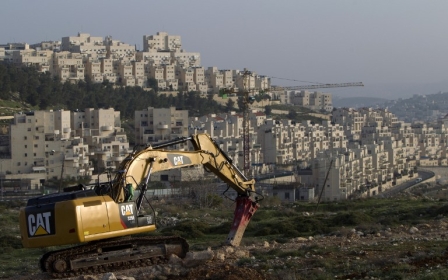GCC eyes better relations with Washington under Trump

NEW YORK, United States – After a lull in relations, leaders in the oil-rich Gulf eye chances to mend ties with their powerful ally, the United States, once President-elect Donald Trump moves his team of pro-business, anti-Iran hawks into the White House in January.
Leaders from the six-nation Gulf Cooperation Council (GCC) were vexed by US President Barack Obama's willingness to make a deal with Iran and his stepping back when Arab Spring protesters toppled Egypt's Hosni Mubarak and other autocrats.
While Trump is a wildcard, some of his top job picks signal policies that may boost US-Gulf relations, from tough talk on Tehran to counter-terrorism, arms transfers and hydrocarbon sales, experts close to Washington's phalanx of GCC-funded lobbyists told Middle East Eye.
They include Trump's nominee for secretary of state, Rex Tillerson, the Exxon Mobil boss who has worked with Qatar and Saudi Arabia, and his planned defense secretary, General James "Mad Dog" Mattis, an anti-Iran hawk who headed the US Central Command in the Middle East.
Fahad Nazer, a scholar and political consultant to the Saudi embassy in Washington, said Gulf monarchies could "strengthen and deepen" US ties by finding "common ground" with Trump's team after the occasionally awkward Obama years.
"The nomination of Rex Tillerson indicates where President-elect Trump is coming from and his appreciation of … complex and interdependent relations between oil consumers and producers and the global energy markets," Nazer told MEE.
Tillerson has praised Qatar as "successful" and "committed" to its people and has spoken of cooperation with Saudi Arabia and the United Arab Emirates – three countries that, along with Bahrain, Oman and Kuwait, make up the GCC.
The nomination of Tillerson, along with another of Trump's picks – Myron Ebell, who rejects the need to curb greenhouse gas emissions, to run the Environmental Protection Agency – is a boon to Gulf hydrocarbon exporters, even as shale oil extraction makes the US less dependent on foreign supplies.
Petro-giant Saudi Aramco is using its leverage with Tillerson while GCC-funded lobby firms are hiring veterans from the US armed forces to appeal to the generals filling Trump's cabinet, Ali Al Ahmed, director of the Institute for Gulf Affairs, told MEE.
They include Mattis and Trump's chosen National Security Adviser, Army Lieutenant General Mike Flynn, who share a widely held view in the Gulf that Iran's support for militias in Iraq, Yemen, Syria and Lebanon destabilises the region.
"They are working with Mr Trump and trying to do business deals as they know he's a businessman," Ahmed told MEE.
Gerald Feierstein, a former US ambassador to Yemen, said Gulf royals are "counting down the days until" Obama vacates the Oval Office and "have reason to be a little optimistic" that Trump will come good on his tough talk against Tehran.
Trump has spoken off nixing or renegotiating the 2015 seven-nation deal that curbed Iran's nuclear work in exchange for sanctions relief. Gulf officials, such as former Saudi spy chief Prince Turki al-Faisal, now want the deal to hold but for Iran to remain relegated as an aggressor.
"The Gulf will be delighted to see an administration in Washington that takes a firmer position on Iran's hegemonic ambitions. What they don't want to see is a more robust US position. They don't want a war on their doorstep,” Feierstein told MEE.
In Trump, they see a leader who, unlike Obama, will instinctively "stand by his friends" and is keener on transactional deal-making than on nagging sheikhdoms about their weak "civil liberties and human rights' records, Feierstein added.
The day after Trump's shock win on 8 November, Saudi King Salman sent a congratulatory cable calling for "security and stability in the Middle East". Other GCC bigwigs made similar appeals for enhanced cooperation in the following days.
While there is hope among Gulf lobbyists, there is also caution, not least because of Trump's claim in March that Saudi Arabia "wouldn’t exist for very long" without US military backing, for which it was failing to reimburse Washington.
Riyadh was failing to stump up troops to defeat the Islamic State group in Iraq and Syria, Trump added.
For Michael Klare, an expert on resource politics at Hampshire College, the GCC could advance "transactional" relations under Trump but would have to "demonstrate subservience" to win "favoured status" in his White House.
"His topmost priority is to annihilate ISIS [the Islamic State group], and he will be looking for allies in this effort - countries that assist in this effort can expect to be rewarded, those that impede US efforts will be punished," Klare told MEE.
"Because Iran is part of the anti-ISIS fight in Iraq and Syria, it may not suffer as much as Trump's campaign rhetoric suggests; by the same token, the Gulf states will come under pressure to cut all financial aid by their citizens to ISIS and other militant Sunni groups in the region."
Riyadh is wary of the tough talk from Trump, Flynn and others on the threat from Middle Eastern Muslim refugees and of political Islam, said Eckart Woertz, a scholar at the Barcelona Centre for International Affairs.
"Wahhabism has almost become a swear word," Woertz told MEE, referring to the puritanical brand of Islam that the rich Saudis spread in poorer parts of the Muslim world.
"They will need to tread very carefully with any international proselytisation, missionary and charity activities that could be associated with Islamist political or terrorist activity," Woertz said.
"You don't want to be in the line of fire. Better to be a well-behaved ally of Washington."
Stay informed with MEE's newsletters
Sign up to get the latest alerts, insights and analysis, starting with Turkey Unpacked
Middle East Eye delivers independent and unrivalled coverage and analysis of the Middle East, North Africa and beyond. To learn more about republishing this content and the associated fees, please fill out this form. More about MEE can be found here.




